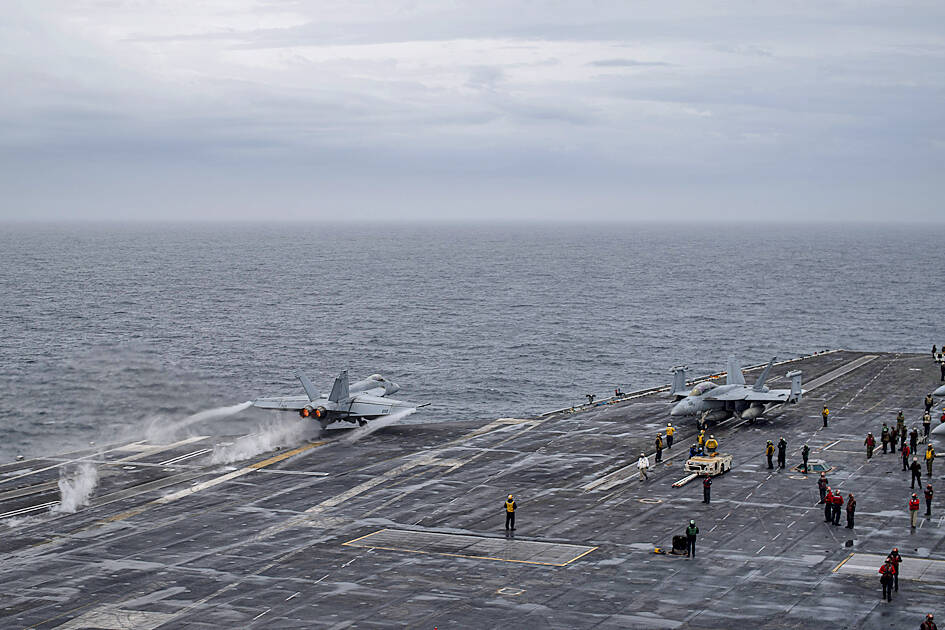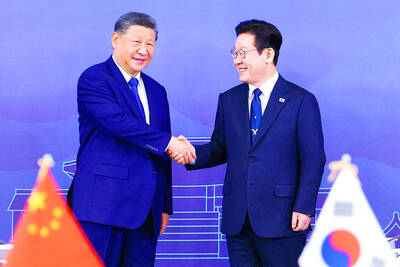The US yesterday wrapped up its first multidomain exercise with Japan and South Korea in the East China Sea, a step forward in Washington’s efforts to enhance and lock in its security partnerships with key Asian allies in the face of growing threats from North Korea and China.
The three-day Freedom Edge increased the sophistication of previous exercises with simultaneous air and naval drills geared toward improving joint ballistic-missile defense, anti-submarine warfare, surveillance and other skills and capabilities.
The exercise, which is expected to expand in years to come, was also intended to improve the countries’ abilities to share missile warnings — increasingly important as North Korea tests ever-more sophisticated systems.

Photo: Mass Communication Specialist Second Class Aaron Haro Gonzalez / The US Navy via AP
Outside of Australia, Japan and South Korea are the only US partners in the region with militaries sophisticated enough to integrate operations with the US so that if, for example, South Korea were to detect a target, it could quickly relay details so Japanese or US counterparts could respond, said Ridzwan Rahmat, a Singapore-based analyst with the defense intelligence company Janes.
“That’s the kind of interoperability that is involved in a typical war scenario,” Rahmat said. “For trilateral exercises like this the intention is to develop the interoperability between the three armed forces so that they can fight better as a cohesive fighting force.”
Such exercises also carry the risk of increasing tensions, with China regularly denouncing drills in what it considers its sphere of influence, and North Korea already slamming the arrival of the USS Theodore Roosevelt carrier group in the Port of Busan — home to South Korea’s navy headquarters and its Gimhae Air Base — in preparation for Freedom Edge as “provocative” and “dangerous.”
On Wednesday, the day after South Korean President Yoon Suk-yeol visited the Roosevelt in Busan, becoming the first sitting South Korean president to board a US aircraft carrier since 1994, North Korea tested what it said was a multiwarhead missile, the first known launch of the developmental weapon, if confirmed.
South Korea’s military said a joint analysis by South Korean and US authorities assessed that the missile launch failed.
The defense cooperation involving Japan and South Korea is also politically complex for Yoon and Japanese Prime Minister Fumio Kishida, due to the lingering resentment over Imperial Japan’s brutal occupation of Korea before and during World War II.
The two countries have the largest militaries among US allies in East Asia — and together host about 80,000 US troops on their territories — but Washington has tended to work with them individually rather than together due to their history.
Kishida’s increase of defense spending and cooperation with South Korea have generally been well received by the Japanese public, but has caused friction with the right wing of his own party, while Yoon’s domestic appeal has weakened, but he has stayed the course.
“South Korea’s shift under the Yoon administration toward improving its relations with Japan has been extremely significant,” said Heigo Sato, an international politics professor and security expert at Takushoku University in Tokyo.
Tensions with North Korea are at their highest point in years, with the pace of leader Kim Jong-un’s weapons programs intensifying, despite heavy international sanctions.
Meanwhile, China has been undertaking a massive military buildup of nuclear and conventional weapons, and has the world’s largest navy. It claims Taiwan and virtually the entirety of the South China Sea as its own territory, and has increasingly turned to its military to press those claims.
Following the exercises in the East China Sea with Japan and South Korea, the Roosevelt is due to sail to the Middle East to help protect ships against attacks by Yemen’s Houthi rebels.
That has made strong security partnerships all the more important, not only with Japan and South Korea, but with Taiwan, Australia, the Philippines and others in the region, and building those up has been a priority for the Biden administration.
“One of the weaknesses of the Chinese navy, despite the number of hulls that they have compared to the Americans, is the fact that they don’t have a network of friendly ports from which they can operate in the event they need to launch a campaign,” Rahmat said. “One of the strengths of the US Navy is not just its ships and its technology, but its ability to call on a vast network of friendly ports and, aware of this strength, they are doubling down by increasing partnerships across the region.”

‘CHILD PORNOGRAPHY’: The doll on Shein’s Web site measure about 80cm in height, and it was holding a teddy bear in a photo published by a daily newspaper France’s anti-fraud unit on Saturday said it had reported Asian e-commerce giant Shein (希音) for selling what it described as “sex dolls with a childlike appearance.” The French Directorate General for Competition, Consumer Affairs and Fraud Control (DGCCRF) said in a statement that the “description and categorization” of the items on Shein’s Web site “make it difficult to doubt the child pornography nature of the content.” Shortly after the statement, Shein announced that the dolls in question had been withdrawn from its platform and that it had launched an internal inquiry. On its Web site, Le Parisien daily published a

China’s Shenzhou-20 crewed spacecraft has delayed its return mission to Earth after the vessel was possibly hit by tiny bits of space debris, the country’s human spaceflight agency said yesterday, an unusual situation that could disrupt the operation of the country’s space station Tiangong. An impact analysis and risk assessment are underway, the China Manned Space Agency (CMSA) said in a statement, without providing a new schedule for the return mission, which was originally set to land in northern China yesterday. The delay highlights the danger to space travel posed by increasing amounts of debris, such as discarded launch vehicles or vessel

RUBBER STAMP? The latest legislative session was the most productive in the number of bills passed, but critics attributed it to a lack of dissenting voices On their last day at work, Hong Kong’s lawmakers — the first batch chosen under Beijing’s mantra of “patriots administering Hong Kong” — posed for group pictures, celebrating a job well done after four years of opposition-free politics. However, despite their smiles, about one-third of the Legislative Council will not seek another term in next month’s election, with the self-described non-establishment figure Tik Chi-yuen (狄志遠) being among those bowing out. “It used to be that [the legislature] had the benefit of free expression... Now it is more uniform. There are multiple voices, but they are not diverse enough,” Tik said, comparing it

RELATIONS: Cultural spats, such as China’s claims over the origins of kimchi, have soured public opinion in South Korea against Beijing over the past few years Chinese President Xi Jinping (習近平) yesterday met South Korean counterpart Lee Jae-myung, after taking center stage at an Asian summit in the wake of US President Donald Trump’s departure. The talks on the sidelines of the APEC gathering came the final day of Xi’s first trip to South Korea in more than a decade, and a day after his meeting with the Canadian prime minister that was a reset of the nations’ damaged ties. Trump had flown to South Korea for the summit, but promptly jetted home on Thursday after sealing a trade war pause with Xi, with the two